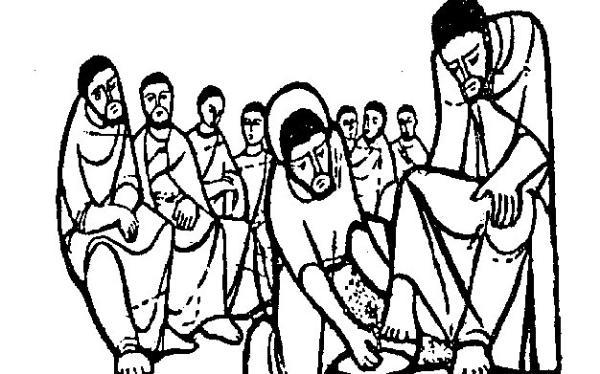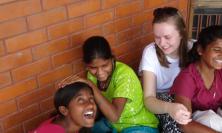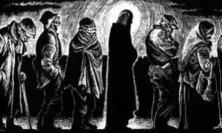Since the onset of the financial crisis, there has been an increase in the number of people in London engaging in voluntary work – work that can be a way of practising and expressing austerity .Our Lenten series continues as Andrea Kelly, Coordinator of London Jesuit Volunteers, describes the often counter-cultural practice of volunteering: how, through caring for the poor and marginalised, do we encounter Christ?
Austerity: choice or chance?
The Lenten climate of austerity, the theme of this series, has traditionally been expressed by three major forms of ascesis (that is, of ‘practice’ or ‘self-training’) through which we seek to follow Christ more closely. The spirit of these three interrelated practices – of prayer, fasting, and care for the poor – is beautifully summarised in the exhortation of Micah , to ‘Act justly, love tenderly, and walk humbly with your God’ (6:6-8). This article focuses on the third practice, sometimes referred to as ‘almsgiving’, but in fact of much broader scope, implying as it does a call to solidarity with the marginalised, and an acknowledgement of our common need. It is an account based on the experience of a very young volunteering project – London Jesuit Volunteers (LJV) – which was launched by Mount Street Jesuit Centre in January 2007.
The extent of poverty and marginalisation in London is of course vast, and has given rise to a wide range of agencies attempting to alleviate many different forms of suffering and alienation. The experience of LJV over the last six months has been that the financial crisis is drawing more people into voluntary action, including, notably, people threatened by redundancy themselves. This is taking place within the wider national context of soul-searching about the effects of a powerfully secularist and consumerist culture on ‘the things that really matter’. And in fact a decade ago the Bishops of England and Wales were already identifying ‘the crumbling of the cement that binds individuals into a society’ and arguing that ‘the common good must prevail, even against strong economic forces that would deny it.’[1]
At a time like this concepts such as ‘less is more’ and ‘living simply’ acquire a new edge – are we talking lifestyle choices here, or spiritual discipline, or brutal necessity? It is of course a continuing source of inspiration that people of good will are coming forward to volunteer. However, the flip side is that the funding of voluntary institutions has been critically undermined. The experience of the Reagan budget cuts in the US in the early 1980s was that ‘people who housed the homeless found themselves fighting those that cared for the sick, all for the same limited dollars ... it was competition in its most perverse form.’[2] And all the time the financial situation is not only driving more people into poverty, but is weighing hardest on the poorest, in a country where we know that nearly 3 million children still live in poverty.[3] So it seems important to say at the outset that there is a yawning chasm between freely choosing austerity, and having it thrust upon you.
A case study: London Jesuit Volunteers
LJV represents a major commitment on the part of the British Jesuits, developed in response to the increasing needs and hardships of those living in poverty in London. LJV members range from 25 to 78 years of age and encompass a wide range of occupations and nationalities. There is currently a community of 35 volunteers who work in placements with 25 different organisations, including: Feltham Young Offenders Institute, the Jesuit Refugee Service, L’Arche, the Missionaries of Charity, Age Concern, the Justice & Peace Commission, St John’s Hospice Befriending, the Women at the Well project, and St Pancras Hospital Chaplaincy. Members commit to: (a) 2-8 hours voluntary work each week, in the London area; (b) reflection in the Ignatian tradition on the experience of volunteering; and (c) sharing this experience in community at monthly LJV group reflection meetings. The combination of a volunteering placement with the opportunity to reflect upon that experience has proved to be a powerful magnet, and meets a deep need to make modern working life ‘meaningful’. Volunteers describe even highly skilled, professional work as ‘abstract’, lacking in real contact with ‘the person’. They also describe the bewilderment of working in a culture where the sacred and the secular are completely compartmentalised. The opportunity to reflect upon volunteering and its relation to the rest of life has already led one LJV member to a radical career change: from working in financial services to becoming a care assistant at the L’Arche community, living alongside adults with learning disabilities. This is movingly described in an accompanying article in Thinking Faith. For other members, volunteering provides a ‘lens’ through which to view their career and provokes vital questions about how to embody Gospel values in the workplace and the home – truly an apostolic activity ‘at the frontiers’.
Giving and receiving
The UK has a long tradition of volunteering associated with the concept of civil society, which itself has been profoundly informed by Christian values, even where these have today been forgotten or set aside. A look at the national website for volunteering www.do-it.org.uk shows something of the richness of the tradition. This ‘third sector’ has undergone professionalisation over the last three decades and has developed a complex relationship with both the structures of state (by which it is now often contracted as an agent) and with the commercial institutions of the market. Enlightened employers understand the value of volunteering for the formation of their staff – in terms of the development of judgement and leadership skills – and many actively support volunteering projects. In their turn volunteers bring commitment, energy, time (that precious resource), life experience and professional know-how of all kinds. The rewards are many and varied: a sense of making a real contribution; new challenges for personal development; an extended social life and network; an enhanced CV for university or job applicants; and recognition of and an outlet for the skills of the retired and semi-retired, to name but a few.
LJV members are certainly not alone in recognising that they receive more than they give. But what does emerge additionally (and gradually) in reflection is the beginning of some understanding of ‘the stranger’, the marginalised one, as someone known personally, and a growing sense of solidarity in the face of injustice; also a strong recognition of blessings received. Over time we begin to realise that it is the poor who are evangelising us:
If you enter into relationship with a lonely or suffering person you will discover something else: that it is you who are being healed … If you will let yourself be moulded thus by the cry of the poor and accept their healing friendship, then they may guide your footsteps into community and lead you into a new vision of humanity … into the kingdom Jesus speaks of.[4]
The challenge for the LJV programme is to help sustain and develop that initial insight and commitment for the longer term. This is where the ascetical ‘practice’ of volunteering begins to bite.
The ‘practice’ that underpins volunteering
In a nutshell, the basic ascetic ‘practice’ is fidelity. Fidelity to the people that the volunteer is accompanying, fidelity to prayer, and fidelity to community – both to LJV as the ‘sending community’ and to the placement as the ‘receiving community’. It sounds very attractive, it sounds very easy, and all of us who have tried to do it have found it very difficult indeed. Some of the stumbling blocks are predictable: particularly over-commitment/lack of time, and the encounter with people and situations that are unfamiliar, and therefore intimidating. More subtly, there comes a point in each person’s volunteering when they question the value of what they are doing. In effect, they look for results – and indeed, how could they not? Have we not all been most rigorously trained to do just that in our day jobs? The words of Archbishop Romero: ‘the kingdom is not only beyond our efforts, it is beyond our vision’, are completely counter-cultural and take a lot of digesting.
This is where the LJV reflection group becomes an important source of strength and support. The group is led by a guide, who is trained in the practice of reflection and prayer embodied in the Spiritual Exercises of St Ignatius of Loyola. The insights gained through the sharing between group members are a source of personal growth, which in turn informs the quality of volunteering. This process of reflection is grounded in Ignatian values:
· The foundation: I am known and loved by God
· My response: gratitude and joy
· Seeking and finding God in all things: ‘contemplatives in action’
· Seeing and finding my deepest desire: engaging with my emotions
· Freedom and discernment: to choose for Christ
· Service rooted in Gospel values
This is very much a process of pushing boundaries – of what is familiar, of what is convenient, of what is immediately compelling. It is a process that depends on our maintaining fidelity to our commitment, in the hope that gradually by this ‘practice’ we may be changed by and for the people we are attempting to accompany and serve.
Good work in hard times
What is happening, then, is a slow process of formation. Franz Jalics writes that ‘Every work with others … depends for its effectiveness more on your own transformation than what you do.’[5] Perhaps this is the fine point where volunteering and the day job may meet and interrogate each other. Chris Bemrose, leader of L’Arche Bognor Regis, writing in the Church Times on 6 July 2007, suggests that L’Arche offers an alternative model to modern management practices. Although L’Arche offers highly professional care, its language is not the language of efficiency and productivity: ‘Just spending time with someone – with no particular objective, except that of becoming a friend – is not just allowed, but encouraged’. The model is the family, and as in a family the focus is on the weakest: ‘L’Arche tends to be guided by the person who is … most vulnerable’.
To return for a moment to the professionalisation of the voluntary sector mentioned above, we could ask what ‘professional’ might mean in this context, and how it might shape our idea of what constitutes ‘good work’. The approach adopted by L’Arche implies a contemplative attitude to others – akin to Simone Weil’s insight that ‘attention is the heart of love’ – as another aspect of ascetic ‘practice’. In the secular context, however, ‘professional’ may imply almost the opposite: the complete separation of personal concern and the provision of care. And there are many shades in between. In the midst of this complexity we sorely need to articulate a theology of ‘good work’ that dispenses with the sacred/secular divide, and that helps us to seek the ‘building up’ of the person, and the kingdom of God, whatever the context in which we find ourselves working.
For the LJV community, the immediate challenge is to develop our own sense of how we embody Gospel values in our daily lives and volunteering, in London, today. As more and more people are affected by ‘The Crunch’, what do we mean now by the dignity of the human person, and the preferential option for the poor? What are we able to do now to assist the marginalised in making their voice heard? And how may we best express solidarity now? And as the boundaries between employed/unemployed, solvent/insolvent, independent/dependent become more and more blurred, is there perhaps also a real opportunity – without entertaining any kind of schadenfreude – to gain insight into our common need, and to search for new ways of working together that are genuinely collaborative and emancipatory? As Gerald O’Hanlon SJ recently suggested on Thinking Faith, maybe this moment of financial turmoil could be used as a catalyst for change, a chance for notions of the common good and solidarity to truly nourish a new vision of society. Perhaps the voluntary sector is a good place to start this kind of dialogue, and certainly the Ignatian heritage within LJV should have much to contribute.
The Sign of the Cross
Finally, however, we have to go forward in the faith that it is God who has initiated our work, and will bring it to completion. This ‘letting go’ is another ascetic ‘practice’ that comes hard. It involves accepting failure, and it bears the Sign of the Cross. Fred Kammer describes a visit by Pedro Arrupe to the Directors of Social Ministries in St Louis in 1975, when Fr Arrupe listened sympathetically to their development plans and then shocked them by predicting that all their efforts would fail:
Arrupe was speaking from a particular theological worldview rooted deeply in the gospels. He saw failure as an intrinsic part of all efforts to effect societal change and build up the reign of God. The view is integral to many forms of spirituality which stress the experience of compassion and companionship with the suffering Christ.[6]
This is not an argument for complacency or incompetence, but a reminder that Christ and his poor remain in our midst, and that their abiding presence – rather than any social project of our own – must remain our true focus.
Andrea Kelly is Coordinator of London Jesuit Volunteers.
[1] The Catholic Bishops’ Conference of England & Wales (1996). The Common Good and the Catholic Church’s Social Teaching.
[2] Kammer, F. (1995). Salted with Fire: Spirituality for the Faithjustice Journey, New York/Mahwah NJ: Paulist Press.
[3] Hirsch, D. (2009). Ending Child Poverty in a Changing Economy, Joseph Rowntree Foundation, accessible online at http://www.jrf.org.uk/publications/ending-child-poverty-changing-economy
[4] Vanier, J. (2005). Befriending the Stranger, London: Darton, Longman & Todd.
[5] Jalics, F. (2003). Contemplative Retreat, Longwood/Florida: Xulon Press.
[6] Kammer, Salted with Fire.
![]() London Jesuit Volunteers
London Jesuit Volunteers![]() Read Dan Nisbett's account of his experience as a London Jesuit Volunteer
Read Dan Nisbett's account of his experience as a London Jesuit Volunteer






